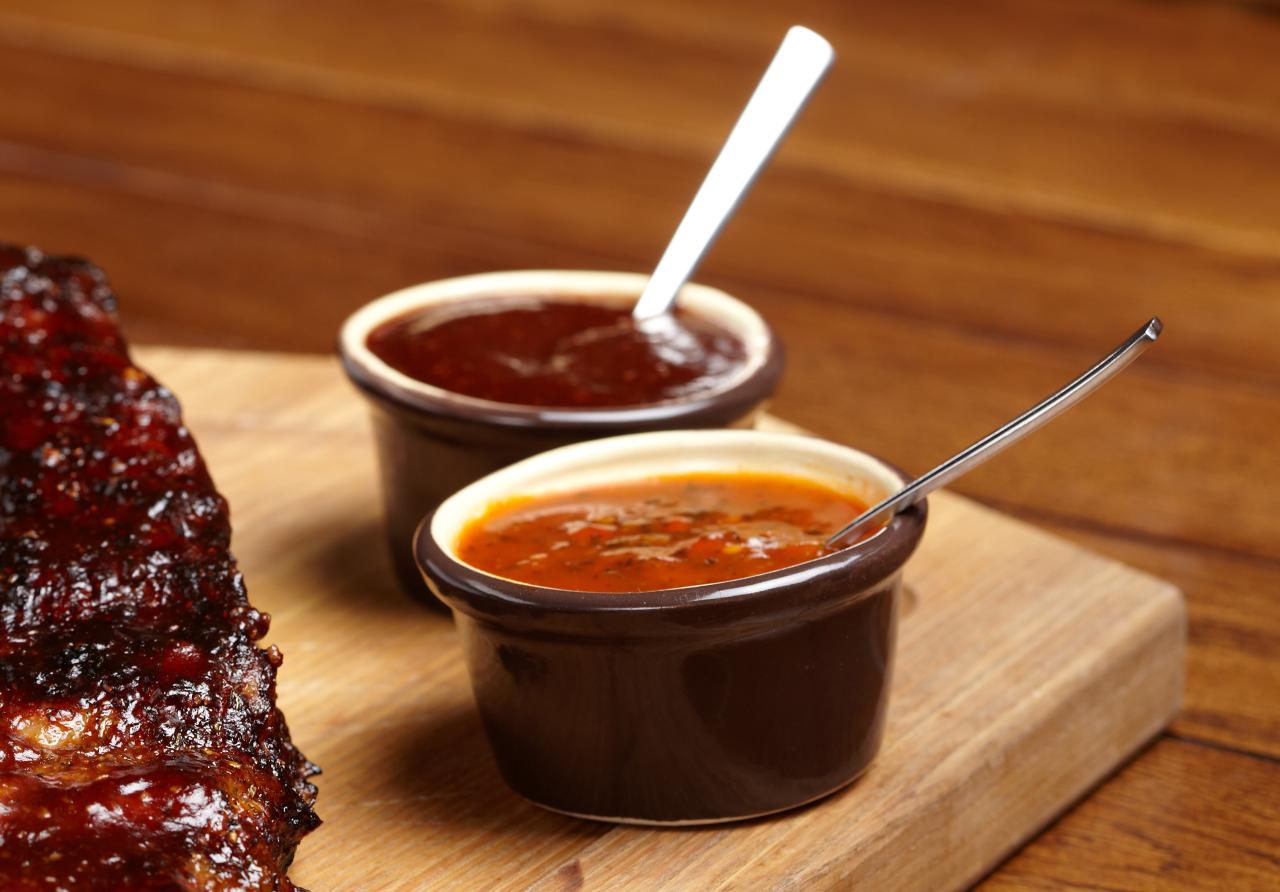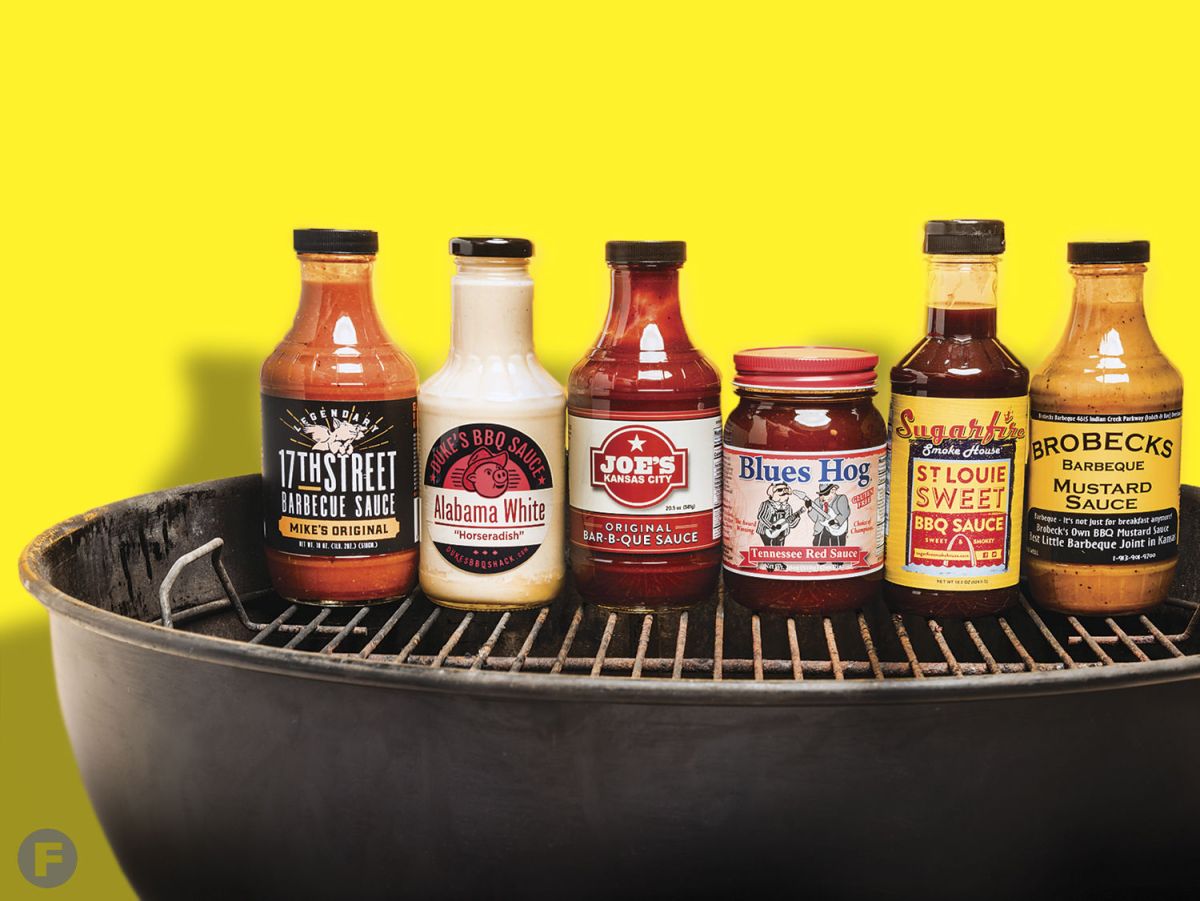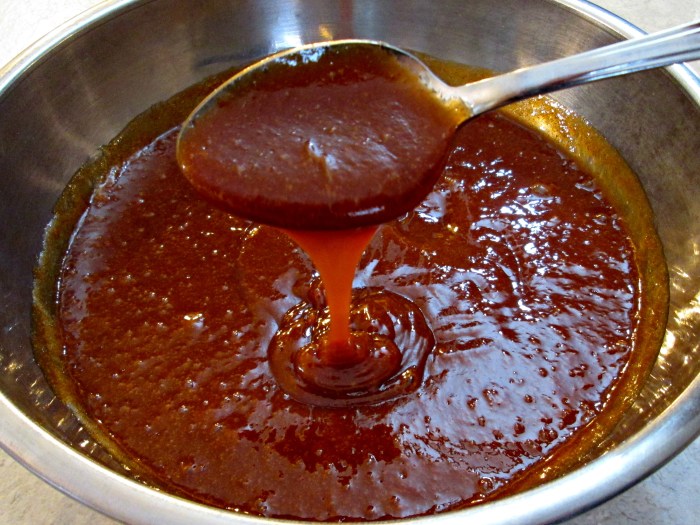Bar B Que Sauce Recipe A Flavorful Guide
Barbecue Sauce: A Flavorful Journey: Bar B Que Sauce Recipe

Source: tasteatlas.com
Bar b que sauce recipe – Barbecue sauce, a culinary cornerstone of American cuisine, boasts a rich history as diverse as the nation itself. Its evolution reflects regional preferences and culinary traditions, resulting in a spectrum of flavors that range from tangy and vinegary to sweet and smoky. This exploration delves into the fascinating world of barbecue sauce, examining its origins, variations, and the art of crafting the perfect blend.
A Brief History and Regional Variations of Barbecue Sauce, Bar b que sauce recipe
Barbecue sauce’s origins are deeply rooted in the American South, evolving from simple mixtures of vinegar and spices to the complex concoctions we know today. Early versions relied heavily on available ingredients, with regional variations reflecting local tastes and traditions. The Carolinas, for example, are renowned for their vinegar-based sauces, while the Midwest often features tomato-based varieties. Kansas City is known for its thick, molasses-rich sauces, and Texas boasts a range of styles, from vinegar-based to tomato-based with a touch of sweetness.
Fundamental Ingredients in Barbecue Sauce

Source: townnews.com
Despite regional differences, most barbecue sauces share a core set of ingredients. These typically include a base (vinegar, tomato paste, or both), a sweetener (sugar, molasses, or honey), and a combination of spices and flavor enhancers. Common additions include onion powder, garlic powder, paprika, and black pepper. The balance of these ingredients determines the sauce’s final flavor profile.
Types of Barbecue Sauce

Source: poormansgourmetkitchen.com
Barbecue sauces are broadly categorized into three main types: vinegar-based, tomato-based, and mustard-based. Each type offers a distinct flavor profile and texture.
| Type | Base | Typical Flavor Profile | Texture |
|---|---|---|---|
| Vinegar-Based | Vinegar (apple cider, white) | Tangy, sharp, often with a subtle sweetness | Thin, runny |
| Tomato-Based | Tomato paste or ketchup | Sweet, savory, often with a smoky depth | Thick, rich |
| Mustard-Based | Mustard (yellow, brown) | Tangy, slightly sweet, with a distinctive mustard flavor | Medium consistency |
Sweet vs. Savory Barbecue Sauce Recipes
The balance between sweet and savory elements is a key factor in determining a barbecue sauce’s character. Sweet sauces often incorporate brown sugar, molasses, or honey, while savory sauces emphasize ingredients like Worcestershire sauce, smoked paprika, or even a touch of hot sauce.
Sweet Barbecue Sauce Recipes:
- Classic Sweet and Tangy BBQ Sauce
- Honey-Garlic BBQ Sauce
- Molasses-Based BBQ Sauce
- Brown Sugar BBQ Sauce with Chipotle Peppers
- Maple-Glazed BBQ Sauce
Savory Barbecue Sauce Recipes:
- Vinegar-Based Carolina BBQ Sauce
- Spicy Chipotle BBQ Sauce
- Worcestershire-Based BBQ Sauce
- Smoked Paprika BBQ Sauce
- Garlic and Pepper BBQ Sauce
Adjusting the ratio of sweet and savory ingredients dramatically alters the final taste. A higher proportion of sweeteners results in a sweeter, more mellow sauce, while increasing savory components creates a bolder, more complex flavor.
Many barbecue sauce recipes rely on a balance of sweet and savory flavors. Interestingly, the principles of achieving that balance are similar to those used in creating other sweet sauces. For instance, the complexity of a good barbecue sauce can be enhanced by considering the techniques employed in a recipe like this apples and caramel sauce recipe , which demonstrates the artful blending of sweet and tart notes.
Ultimately, understanding diverse flavor profiles can help elevate your own barbecue sauce creations.
Spices and Flavor Enhancers in Barbecue Sauce
Spices play a crucial role in shaping the flavor profile of barbecue sauce. Common additions include garlic powder, onion powder, chili powder, black pepper, and paprika. The type of vinegar used also significantly impacts the final product. Apple cider vinegar lends a fruity sweetness, while white vinegar provides a sharper, more acidic tang.
| Spice | Flavor Impact | Suggested Usage |
|---|---|---|
| Garlic Powder | Savory, pungent | Adds depth and richness |
| Onion Powder | Savory, slightly sweet | Balances sweetness and adds complexity |
| Chili Powder | Spicy, smoky | Adds heat and depth |
| Black Pepper | Sharp, slightly spicy | Enhances other flavors |
| Paprika | Sweet, smoky | Adds color and subtle smokiness |
Liquid smoke provides an intense smoky flavor without the need for actual smoking. It is a versatile ingredient that can be used in moderation to enhance the smoky notes of the sauce.
Cooking Methods and Techniques for Barbecue Sauce
Barbecue sauce can be prepared using various methods, each offering unique advantages and disadvantages. Stovetop cooking allows for precise control over the cooking process, while slow cookers offer a hands-off approach.
Stovetop Method:
- Combine all ingredients in a saucepan over medium heat.
- Bring to a simmer, stirring frequently to prevent sticking.
- Reduce heat to low and simmer for 20-30 minutes, or until the sauce has thickened to the desired consistency.
- Remove from heat and let cool slightly before using.
Stovetop cooking provides more control over the consistency and allows for quick adjustments. Slow cookers, on the other hand, are ideal for a hands-off approach but may require longer cooking times and less precise control over the final texture.
Serving Suggestions and Pairings for Barbecue Sauce
Barbecue sauce’s versatility extends beyond its traditional use as a meat glaze. It serves as a delicious dipping sauce for vegetables, a marinade for chicken, or even an ingredient in baked beans. Pairing the right sauce with the right food enhances the overall dining experience.
| Barbecue Sauce Type | Ideal Food Pairing |
|---|---|
| Sweet BBQ Sauce | Pork ribs, pulled pork, grilled chicken |
| Spicy BBQ Sauce | Chicken wings, burgers, grilled shrimp |
| Vinegar-Based BBQ Sauce | Pulled pork sandwiches, brisket, collard greens |
| Mustard-Based BBQ Sauce | Pork chops, grilled sausages, roasted vegetables |
A well-presented dish featuring barbecue sauce is visually appealing, with a rich, glossy sheen reflecting the sauce’s texture and color. The sauce’s consistency can vary from a thin, drizzling glaze to a thick, coating layer, adding depth and visual interest to the dish.
FAQ Corner
Can I freeze barbecue sauce?
Yes, barbecue sauce freezes well. Store it in airtight containers for up to 3 months.
How long does homemade barbecue sauce last in the refrigerator?
Properly stored in the refrigerator, homemade barbecue sauce typically lasts for 1-2 weeks.
What can I substitute for liquid smoke?
While nothing perfectly replicates liquid smoke, you can try adding a touch of smoked paprika or a few drops of strong brewed black tea for a hint of smokiness.
Can I use different types of sugar in the recipe?
Yes, you can experiment with brown sugar, granulated sugar, honey, or maple syrup, adjusting the amount based on the sweetness of your chosen sugar.





















